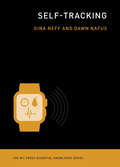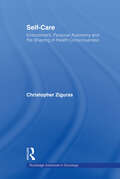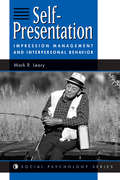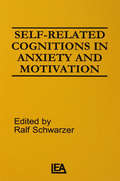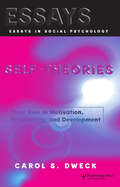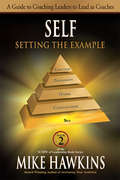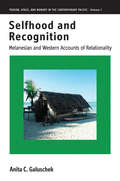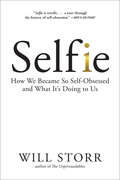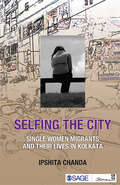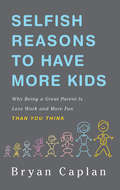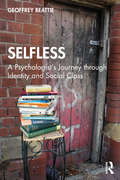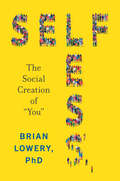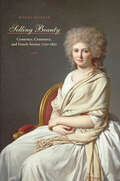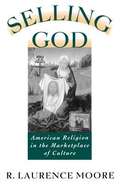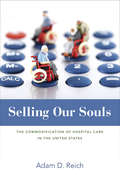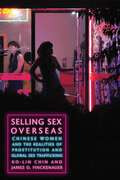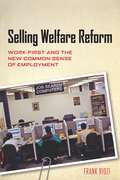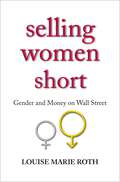- Table View
- List View
Self-Tracking: The Mit Press Essential Knowledge Series (The MIT Press Essential Knowledge series)
by Gina Neff Dawn NafusWhat happens when people turn their everyday experience into data: an introduction to the essential ideas and key challenges of self-tracking.People keep track. In the eighteenth century, Benjamin Franklin kept charts of time spent and virtues lived up to. Today, people use technology to self-track: hours slept, steps taken, calories consumed, medications administered. Ninety million wearable sensors were shipped in 2014 to help us gather data about our lives. This book examines how people record, analyze, and reflect on this data, looking at the tools they use and the communities they become part of. Gina Neff and Dawn Nafus describe what happens when people turn their everyday experience—in particular, health and wellness-related experience—into data, and offer an introduction to the essential ideas and key challenges of using these technologies. They consider self-tracking as a social and cultural phenomenon, describing not only the use of data as a kind of mirror of the self but also how this enables people to connect to, and learn from, others.Neff and Nafus consider what's at stake: who wants our data and why; the practices of serious self-tracking enthusiasts; the design of commercial self-tracking technology; and how self-tracking can fill gaps in the healthcare system. Today, no one can lead an entirely untracked life. Neff and Nafus show us how to use data in a way that empowers and educates.
Self-care: Embodiment, Personal Autonomy and the Shaping of Health Consciousness (Routledge Advances in Sociology)
by Christopher ZigurasThis book examines the widespread cultural and political consequences of the proliferation of popular health advice. It provides a key theoretical contribution to the sociological study of health and embodiment by illuminating the processes of social change that have transformed how individuals care for themselves and the ways in which power and desire now shape health behaviour. Self-Care will be of essential interest to students and academics working within the fields of sociology, health and social welfare.
Self-ownership, freedom, and equality
by G. A. CohenDefenders of capitalism claim that its inequality is the necessary price of the freedom that it guarantees. In that defense of capitalist inequality, freedom is self-ownership, the right of each person to do as he wishes with himself. The author shows that self-ownership fails to deliver the freedom it promises to secure. He thereby undermines the idea that lovers of freedom should embrace capitalism and the inequality that comes with it. In the final chapter he reaffirms the moral superiority of socialism, against the background of the disastrous Soviet experiment.
Self-presentation: Impression Management And Interpersonal Behavior
by Mark R LearyThis book is about the ways which human behavior is affected concerns with people may be doing, their public impressions they typically prefer that No matter what else other people perceive them in certain desired ways and not perceive them in other, undesired ways. Put simply, human beings have a pervasive and ongoing concern with their self-presentations. Sometimes they act in ceflain ways just to make a particular impression on someone else mras when a job applicant responds inthat will satisfactorily impress the interviewer. But more often, people 5 concerns with others’ impressions simply constrain their behavioural options. Most of the time inclined to do things that will lead others to see us as incompetent, inwnoral, maladjusted, or otherwise socially undesirable. As a result, our concerns with others’ impressions limit what we are willing to do.Self-presentation almotives underlie and pervade near corner of interpersonal life.
Self-related Cognitions in Anxiety and Motivation
by Ralf SchwarzerResearch on anxiety and motivation has witnessed substantial progress in recent years in developing innovative perspectives and applying advanced psychometric tools. The most important contributions were made by cognitively oriented psychologists who have related the information processing view to anxiety and motivation. The organized knowledge about oneself and the storage, processing and retrieval of information concerned with one's attitude and behavior strongly influences the way people think, feel and act. Therefore, self-referent thoughts play a major role as a cognitive component in anxiety and motivation. It is the idea of this book to integrate different lines of thinking in the field of anxiety and motivation by relating both topics to self-focussed attention, self-concept and self-evaluation in achievement contexts as well as in social contexts.
Self-studies in Rural Teacher Education
by Ann K. Schulte Bernadette Walker-GibbsThe purpose of this book is to highlight the work of teacher educators in the field of rural education. In this book, education faculty who work in teacher education study the ways in which one's identity impacts one's teaching and the partnerships with rural schools. Although the field of research on teacher preparation has an abundance of studies on preparing students for the challenges of urban settings, there is much less emphasis on rural education, despite the prevalence of rural schools. This book problematises notions of rural or rurality which is often considered via a deficit or a generalised model where a stereotype of one kind of rural is outlined. Developing more multi-faceted understandings of rurality is a key to attracting and retaining teachers who understand the complexities and opportunities of living and working in rural spaces.
Self-theories: Their Role in Motivation, Personality, and Development (Essays in Social Psychology)
by Carol S. DweckThis innovative text sheds light on how people work -- why they sometimes function well and, at other times, behave in ways that are self-defeating or destructive. The author presents her groundbreaking research on adaptive and maladaptive cognitive-motivational patterns and shows:* How these patterns originate in people's self-theories* Their consequences for the person -- for achievement, social relationships, and emotional well-being* Their consequences for society, from issues of human potential to stereotyping and intergroup relations* The experiences that create them This outstanding text is a must-read for researchers in social psychology, child development, and education, and is appropriate for both graduate and senior undergraduate students in these areas.
Self: Setting the Example (SCOPE of Leadership Book Series #2)
by Mike HawkinsHow to cultivate character and mental fitness to run the show. Second in the “most comprehensive treatment of leadership I’ve ever seen by one author” (Jim Kouzes, coauthor of The Leadership Challenge).Self: Setting the Example sets the foundation for the ability to lead others by developing the competencies of great self-leadership. Effective leaders possess intrinsic passion, character, courage, and confidence that others respect and want to follow. When you lead yourself well, operate productively, and think strategically, others notice and are motivated to attain the higher standards you demonstrate.The SCOPE of Leadership book series teaches the principles of a coaching approach to leadership and how to achieve exceptional results by working through people. You will learn a straightforward framework to guide you in developing, enabling, exhorting, inspiring, managing, and assimilating people. Benefit from the wisdom of many years of leadership, consulting, and executive coaching experience. Discover how to develop the competencies that align consistently with great leadership.
Selfhood and Recognition: Melanesian and Western Accounts of Relationality (Person, Space and Memory in the Contemporary Pacific #7)
by Anita C. GaluschekThe disciplines of philosophy and cultural anthropology have one thing in common: human behavior. Yet surprisingly, dialogue between the two fields has remained largely silent until now. Selfhood and Recognition combines philosophical and cultural anthropological accounts of the perception of individual action, exploring the processes through which a person recognizes the self and the other. Touching on humanity as porous, fractal, dividual, and relational, the author sheds new light on the nature of selfhood, recognition, relationality, and human life.
Selfie: How We Became So Self-Obsessed and What It's Doing to Us
by Will Storr“An intriguing odyssey” though the history of the self and the rise of narcissism (The New York Times).Self-absorption, perfectionism, personal branding—it wasn’t always like this, but it’s always been a part of us. Why is the urge to look at ourselves so powerful? Is there any way to break its spell—especially since it doesn’t necessarily make us better or happier people? Full of unexpected connections among history, psychology, economics, neuroscience, and more, Selfie is a “terrific” book that makes sense of who we have become (NPR’s On Point). Award-winning journalist Will Storr takes us from ancient Greece, through the Christian Middle Ages, to the self-esteem evangelists of 1980s California, the rise of the “selfie generation,” and the era of hyper-individualism in which we live now, telling the epic tale of the person we all know so intimately—because it’s us.“It’s easy to look at Instagram and selfie-sticks and shake our heads at millennial narcissism. But Will Storr takes a longer view. He ignores the easy targets and instead tells the amazing 2,500-year story of how we’ve come to think about our selves. A top-notch journalist, historian, essayist, and sleuth, Storr has written an essential book for understanding, and coping with, the 21st century.” —Nathan Hill, New York Times-bestselling author of The Nix“This fascinating psychological and social history . . . reveals how biology and culture conspire to keep us striving for perfection, and the devastating toll that can take.”—The Washington Post “Ably synthesizes centuries of attitudes and beliefs about selfhood, from Aristotle, John Calvin, and Freud to Sartre, Ayn Rand, and Steve Jobs.” —USA Today“Eminently suitable for readers of both Yuval Noah Harari and Daniel Kahneman, Selfie also has shades of Jon Ronson in its subversive humor and investigative spirit.” —Bookseller“Storr is an electrifying analyst of Internet culture.” —Financial Times“Continually delivers rich insights . . . captivating.” —Kirkus Reviews
Selfing the City: Single Women Migrants and Their Lives in Kolkata
by Ipshita ChandaExploring the quest for ‘self’ in the city through migrant women’s narratives This ethnographical study explores the process of migration and its economic, social and psychological dimensions, throwing light on the connection between middle-class women migrants and city spaces. The study is based on a survey, discussions and interviews, and highlights the emergence of a gendered citizen in an unknown and then gradually made-known or ‘selfed’ city. Through their narratives, these women share their experiences of the emergence of the embodied ‘self’ while negotiating a modern urban space. This includes challenging existing notions of empowerment, intimacy and security, suggesting how what women need brings forth changes in themselves and in the process shapes the future of cities.
Selfish Reasons to Have More Kids: Why Being a Great Parent is Less Work and More Fun Than You Think
by Bryan CaplanWe've needlessly turned parenting into an unpleasant chore. Parents invest more time and money in their kids than ever, but the shocking lesson of twin and adoption research is that upbringing is much less important than genetics in the long run. These revelations have surprising implications for how we parent and how we spend time with our kids. The big lesson: Mold your kids less and enjoy your life more. Your kids will still turn out fine. Selfish Reasons to Have More Kids is a book of practical big ideas. How can parents be happier? What can they change--and what do they need to just accept? Which of their worries can parents safely forget? Above all, what is the right number of kids for you to have? You'll never see kids or parenthood the same way again.
Selfless: A Psychologist's Journey Through Identity And Social Class
by Geoffrey BeattieSelfless is a memoir, reflecting on identity, social class, mobility, education, and on psychology itself; how psychology as a discipline is conducted, how it prioritises objects of study, how it uncovers psychological truths about the world. Geoffrey Beattie takes the reader on a journey through his early life in working-class Belfast, his Ph.D. at Trinity College Cambridge and subsequent academic and professional career, to explore fundamental issues within psychology about social class and social identity. Beattie discusses the difficulties inherent in this process of education and change, and how social background affects how you view academic work and the subject matter of one’s discipline. This book movingly details a life and how it is changed by the processes of education, the psychological pressures when abandoning those close to you, the dissonance within and how it feels and operates. The book takes a critical look at psychology from the other side, and examines the process of becoming ‘selfless’, meaning having little sense of self rather than being overly concerned with the wishes and needs of others. Showing how our early experiences and their influence continues throughout life, Beattie’s emotionally engaging, entertaining, and witty text offers general readers, students, and academics fresh insights into psychology, adaptation and personal change.
Selfless: The Social Creation of “You”
by Brian LowerySocial psychologist and Stanford professor Brian Lowery presents a provocative, powerful theory of identity, arguing that there is no essential "self"—our selves are social creations of those with whom we interact —exploring what that means for who we can be and who we allow others to be. There’s nothing we spend more time with, but understand less, than ourselves. You’ve been with yourself every waking moment of your life. But who—or, rather, what—are you? In Selfless, Brian Lowery argues for the radical idea that the “self” as we know it—that “voice in your head”—is a social construct, created in our relationships and social interactions. We are unique because our individual pattern of relationships is unique. We change because our relationships change. Your self isn’t just you, it’s all around you.Lowery uses this research-driven perspective of selfhood to explore questions of inequity, race, gender, politics, and power structures, transforming our perceptions of how the world is and how it could be. His theory offers insight into how powerful people manage their environment in sophisticated, often unconscious, ways to maintain the status quo; explains our competing drives for deep social connection and personal freedom; and answers profound, personal questions such as: Why has my sense of self evolved over time? Why do I sometimes stop short of changes that I want to make in life? In Selfless, Lowery persuasively breaks down common assumptions and beliefs; his insights are humbling. Despite what many may think, we aren’t islands unto ourselves; we are the creation of the many hands that touch us. We don’t just exist in communities, we are created and shaped by them. Our highs and lows are not only our own but belong to others as well. By recognizing that we are products of relationships—from fleeting transactions to deep associations—we shatter the myth of individualism and free ourselves to make our lives and the world accordingly.
Selling Beauty: Cosmetics, Commerce, and French Society, 1750–1830 (The Johns Hopkins University Studies in Historical and Political Science)
by Morag MartinAn “enjoyable” history of the French cosmetic industry and the evolution of beauty standards and commercial culture during a revolutionary era (European History Quarterly).As the French citizenry rebelled against the excesses of the aristocracy, there was a parallel shift in consumer beauty practices. Powdered wigs, alabaster white skin, and rouged cheeks disappeared in favor of a more natural and simple style.Selling Beauty challenges expectations about past fashions and offers a unique look into consumer culture and business practices. Morag Martin introduces readers to the social and economic world of cosmetic production and consumption, recounts criticisms against the use of cosmetics from a variety of voices, and examines how producers and retailers responded to quickly evolving fashions.Martin shows that the survival of the industry depended on its ability to find customers among the emerging working and middle classes. But the newfound popularity of cosmetics raised serious questions. Critics—from radical philosophes to medical professionals—complained that the use of cosmetics was a threat to social morals and questioned the healthfulness of products that contained arsenic, mercury, and lead. Cosmetic producers embraced these withering criticisms, though, skillfully addressing these concerns in their marketing campaigns, reassuring consumers of the moral and physical safety of their products.Rather than disappearing along with the Old Regime, the commerce of cosmetics, reimagined and redefined, flourished in the early nineteenth century—as political ideals and Enlightenment philosophies radically altered popular sentiment.
Selling Ethnic Neighborhoods: The Rise of Neighborhoods as Places of Leisure and Consumption (Routledge Advances in Geography)
by Jan Rath Volkan AytarWhile ethnic neighborhoods are usually associated with poverty, crime and social problems, they have also emerged as places of leisure and consumption, providing opportunities for numerous entrepreneurs and employees. Local and national governments and other regulatory actors, as well as the media, have started to see and promote these neighborhoods as urban attractions for tourists, city dwellers and others. This book aims to analyze the roles of ethnic entrepreneurs and their associations and governments, and - by extension - of consumers and other actors in the rise of ethnic neighborhoods as places of leisure and consumption. Through case studies, it situates those neighborhoods at the edge of different theoretical debates about urban political economy and the politics of culture, and seeks a dynamic synergy between both.
Selling Free Enterprise: The Business Assault on Labor and Liberalism, 1945-60
by Elizabeth A. Fones-WolfExplores the following topic: PART 1 The Postwar Employer Counteroffensive PART 2 In the Factory PART 3 In the Community PART 4 Institutions PART 5 After the Merger
Selling God: American Religion in the Marketplace of Culture
by R. Laurence Moore[Back Cover] "Religion in America is up for sale. The products range from a plethora of merchandise in questionable taste--such as Bible-based diet books (More of Jesus. Less of Me), Rapture T-shirts (one features a basketball game with half its players disappearing in the Rapture--the caption is "Fast Break"), and bumper stickers and frisbees with inspirational messages--to the unabashed consumerism of Jim Bakker's Heritage USA, a grandiose Christian theme park with giant water slide, shopping mall, and office complex. We tend to think of these phenomena--which also include a long line of multimillionaire televangelists and the almost manic promotion of Christmas giving--as a fairly recent development. But as R. Laurence Moore points out in Selling God, religion has been deeply involved in our commercial culture since the beginning of the nineteenth century. In a sweeping, colorful history that spans over two centuries of American culture, Moore examines the role of religion in the marketplace, revealing how religious leaders have borrowed (and invented) commercial practices to promote religion--and how business leaders have borrowed (and invented) religion to promote commerce. It is a book peopled by a fascinating roster of American originals, including showman P.T. Barnum and painter Frederick Church, film directors D.W. Griffith and evangelist Norman Vincent Peale. Ranging from the rise of gymnasiums and "muscular Christianity," to L. Ron Hubbard's Church of Scientology, Selling God provides both fascinating social history and an insightful look at religion in America."
Selling Modernity: Advertising in Twentieth-Century Germany
by S. Jonathan Wiesen Pamela E. Swett Jonathan R. ZatlinThe sheer intensity and violence of Germany's twentieth century--through the end of an empire, two world wars, two democracies, and two dictatorships--provide a unique opportunity to assess the power and endurance of commercial imagery in the most extreme circumstances. Selling Modernity places advertising and advertisements in this tumultuous historical setting, exploring such themes as the relationship between advertising and propaganda in Nazi Germany, the influence of the United States on German advertising, the use of advertising to promote mass consumption in West Germany, and the ideological uses and eventual prohibition of advertising in East Germany. While the essays are informed by the burgeoning literature on consumer society, Selling Modernity focuses on the actors who had the greatest stake in successful merchandising: company managers, advertising executives, copywriters, graphic artists, market researchers, and salespeople, all of whom helped shape the depiction of a company's products, reputation, and visions of modern life. The contributors consider topics ranging from critiques of capitalism triggered by the growth of advertising in the 1890s to the racial politics of Coca-Cola's marketing strategies during the Nazi era, and from the post-1945 career of an erotica entrepreneur to a federal anti-drug campaign in West Germany. Whether analyzing the growing fascination with racialized discourse reflected in early-twentieth-century professional advertising journals or the postwar efforts of Lufthansa to lure holiday and business travelers back to a country associated with mass murder, the contributors reveal advertising's central role in debates about German culture, business, politics, and society. Contributors. Shelley Baranowski, Greg Castillo, Victoria de Grazia, Guillaume de Syon, Holm Friebe, Rainer Gries, Elizabeth Heineman, Michael Imort, Anne Kaminsky, Kevin Repp , Corey Ross, Jeff Schutts, Robert P. Stephens, Pamela E. Swett, S. Jonathan Wiesen, Jonathan R. Zatlin
Selling Our Souls: The Commodification of Hospital Care in the United States
by Adam Dalton ReichHealth care costs make up nearly a fifth of U.S. gross domestic product, but health care is a peculiar thing to buy and sell. Both a scarce resource and a basic need, it involves physical and emotional vulnerability and at the same time it operates as big business. Patients have little choice but to trust those who provide them care, but even those providers confront a great deal of medical uncertainty about the services they offer. Selling Our Souls looks at the contradictions inherent in one particular health care market—hospital care. Based on extensive interviews and observations across the three hospitals of one California city, the book explores the tensions embedded in the market for hospital care, how different hospitals manage these tensions, the historical trajectories driving disparities in contemporary hospital practice, and the perils and possibilities of various models of care.As Adam Reich shows, the book's three featured hospitals could not be more different in background or contemporary practice. PubliCare was founded in the late nineteenth century as an almshouse in order to address the needs of the destitute. HolyCare was founded by an order of nuns in the mid-twentieth century, offering spiritual comfort to the paying patient. And GroupCare was founded in the late twentieth century to rationalize and economize care for middle-class patients and their employers. Reich explains how these legacies play out today in terms of the hospitals' different responses to similar market pressures, and the varieties of care that result.Selling Our Souls is an in-depth investigation into how hospital organizations and the people who work in them make sense of and respond to the modern health care market.
Selling Sex Overseas: Chinese Women and the Realities of Prostitution and Global Sex Trafficking
by Ko-lin Chin James O. Finckenauer2013 Outstanding Book Award Winner from the Division of International Criminology, American Society of CriminologyEvery year, thousands of Chinese women travel to Asia and the United States in order to engage in commercial sex work. In Selling Sex Overseas, Ko-lin Chin and James Finckenauer challenge the current sex trafficking paradigm that considers all sex workers as victims, or sexual slaves, and as unwilling participants in the world of commercial sex. Bringing to life an on-the-ground portrait of this usually hidden world, Chin and Finckenauer provide a detailed look at all of its participants: sex workers, pimps, agents, mommies, escort agency owners, brothel owners, and drivers. Ultimately, they probe the social, economic, and political organization of prostitution and sex trafficking, contradicting many of the ‘moral crusaders’ of the human trafficking world.
Selling War, Selling Hope: Presidential Rhetoric, The News Media, And U. S. Foreign Policy Since 9/11
by Anthony R. DiMaggioDetails how presidents utilize mass media to justify foreign policy objectives in the aftermath of 9/11.
Selling Welfare Reform: Work-First and the New Common Sense of Employment
by Frank RidziThe 1996 Welfare Reform Act promised to end welfare as we knew it. In Selling Welfare Reform, Frank Ridzi uses rich ethnographic detail to examine how new welfare-to-work policies, time limits, and citizenship documentation radically changed welfare, revealing what really goes on at the front lines of the reformed welfare system. Selling Welfare Reform chronicles how entrepreneurial efforts ranging from front-line caseworkers to high-level administrators set the pace for restructuring a resistant bureaucracy. At the heart of this remarkable institutional transformation is a market-centered approach to human services that re-framed the definition of success to include diversion from the present system, de-emphasis of legal protections and behavioral conditioning of poor parents to accommodate employers. Ridzi draws a compelling portrait of how welfare staff and their clients negotiate the complexities of the low wage labor market in an age of global competition, exposing the realities of how the new "common sense" of poverty is affecting the lives of poor and vulnerable Americans.
Selling Women Short: Gender and Money on Wall Street
by Louise Marie RothRocked by a flurry of high-profile sex discrimination lawsuits in the 1990s, Wall Street was supposed to have cleaned up its act. It hasn't. Selling Women Short is a powerful new indictment of how America's financial capital has swept enduring discriminatory practices under the rug. Wall Street is supposed to be a citadel of pure economics, paying for performance and evaluating performance objectively. People with similar qualifications and performance should receive similar pay, regardless of gender. They don't. Comparing the experiences of men and women who began their careers on Wall Street in the late 1990s, Louise Roth finds not only that women earn an average of 29 percent less but also that they are shunted into less lucrative career paths, are not promoted, and are denied the best clients. Selling Women Short reveals the subtle structural discrimination that occurs when the unconscious biases of managers, coworkers, and clients influence performance evaluations, work distribution, and pay. In their own words, Wall Street workers describe how factors such as the preference to associate with those of the same gender contribute to systematic inequality. Revealing how the very systems that Wall Street established ostensibly to combat discrimination promote inequality, Selling Women Short closes with Roth's frank advice on how to tackle the problem, from introducing more tangible performance criteria to curbing gender-stereotypical client entertaining activities. Above all, firms could stop pretending that market forces lead to fair and unbiased outcomes. They don't.
Selling in Customer Service: Integrating and Coordinating Service and Selling
by Leon Cai"Service" in this book refers to the behaviors and actions of serving customers. "Selling" in this book refers to the behaviors and actions of selling products to customers. Hence, this book is completely different from other books on these subjects—Despite the fact that there are many books on service improvement and many related to selling skills worldwide, there are few books on how service and selling are integrated and coordinated. Primarily, it focuses on the interaction and transition between "the behavior of service" and "the behavior of selling" by sharing methods and skills of how those two are interrelated. This book provides many helpful guidelines and solutions for turning customers’ satisfaction with service into growth in sales. Through many refreshing ideas, the author helps you deeply understand the significance of integration of and conversion between service and selling and the harm of disconnection between service and selling. Many new ideas and viewpoints, which are different from other service books or sales books, are discussed, such as the contention that "over-service and over-selling should be prevented."Instead of: Giving highly complex and abstract definitions of "service" or "selling," this book redefines service and selling with "say YES to customers" and "Make customers say YES" respectively. Insisting that customers’ satisfaction with service will naturally lead to their long-term loyalty, this book emphasizes that customers' satisfaction with service has a shelf lifetime, which will soon fade over time. Taking the achievement of customer satisfaction as the final purpose of service, the author believes that "the end of service is not customer satisfaction, but to create new customer needs and achieve increased sales." Taking "meeting or exceeding customer expectations" as the golden rule, the author insists that "customer expectations need to be reduced first, then satisfied, and upgraded finally." Focusing on the development of customers’ buying needs like other books do, this book focuses oppositely on the research of "why customers have no buying needs."
